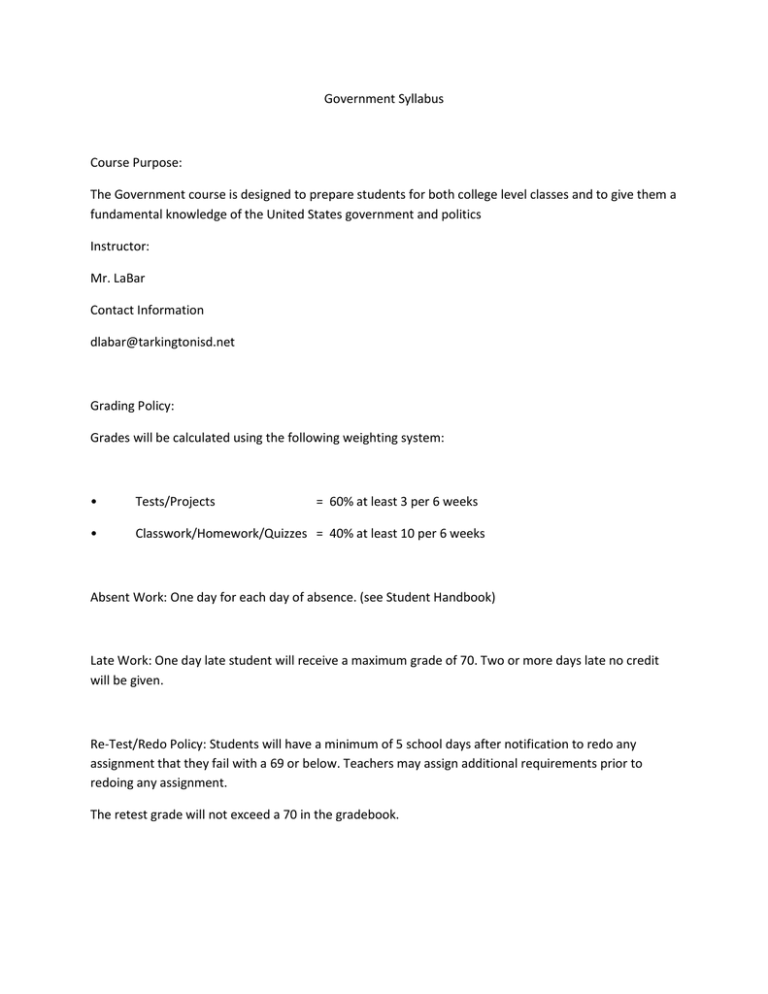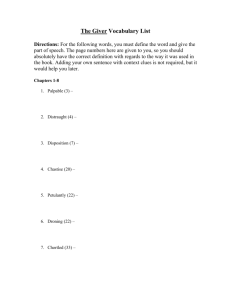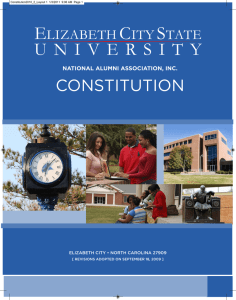government_syllabus
advertisement

Government Syllabus Course Purpose: The Government course is designed to prepare students for both college level classes and to give them a fundamental knowledge of the United States government and politics Instructor: Mr. LaBar Contact Information dlabar@tarkingtonisd.net Grading Policy: Grades will be calculated using the following weighting system: • Tests/Projects = 60% at least 3 per 6 weeks • Classwork/Homework/Quizzes = 40% at least 10 per 6 weeks Absent Work: One day for each day of absence. (see Student Handbook) Late Work: One day late student will receive a maximum grade of 70. Two or more days late no credit will be given. Re-Test/Redo Policy: Students will have a minimum of 5 school days after notification to redo any assignment that they fail with a 69 or below. Teachers may assign additional requirements prior to redoing any assignment. The retest grade will not exceed a 70 in the gradebook. Projects: Due on or before the due date. If a project is turned in one day after the due date, the maximum grade possible will be 70. A project more than one day late will not be accepted. Textbook: Magruder's American Government Unit Overview: Unit 1 -Celebrate Freedom Week Unit 2 -Foundations and Constitutional principles Chapters 1, 2, and 3 During this unit, students culminate their learning about how the national government of the United States developed with a study of the important legal traditions, philosophical ideals, and significant historical events that informed this development. Students learn about the debates and compromises that surrounded the creation of the Constitution and the significant provisions of the Constitution including the Bill of Rights and students make a comparison of the system of government created in the U.S. Constitution with other models of government. Unit 3 -Political Behavior Chapters 10 and 11 During this unit, students learn how the United States government, whose power derives from the consent of the governed, depends on citizen participation. In the United States, citizens, groups, and institutions seek to influence public opinion and the political process believing their actions shape governmental policy. Political parties provide a venue for citizens to initiate change, express a point of view, and transform public policy. This unit examines the roles political parties, the media, businesses, and interest groups play in the political process. Unit 4 -Legislative Branch: The Congress Chapter 4 During this unit students investigate questions such as, “How does the legislature work? What are the functions of Congress? What powers does the legislature have and how are those powers limited? What impact have legislative decisions had on the United States Unit 5 - Executive Branch: The Presidency and the Bureaucracy Chapters 5 and6 During this unit students investigate the executive branch, headed by the President, and the eight distinct roles the president and the executive branch play: head of state, chief executive, chief economic planner, chief diplomat, commander in chief, chief legislator, party chief, and chief citizen. Unit 6 - Judicial Branch: The Courts and Civil Liberties Chapters 7 and 8 During this unit students gain an understanding of the U.S. court system and how it functions to protect minority viewpoints and individual rights. In the next unit students learn about state and local governments. Unit 7 -State and Local Government Chapter 13 During this unit students apply what they have learned about the three branches of the national government to understand state and local governments. Unit 8 -Government and American Culture Chapter 10 During this unit, students, recognizing that identifying and forming opinions about contemporary government issues is essential to a strong democracy, choose a contemporary issue to analyze and suggest actions regarding that issue.



